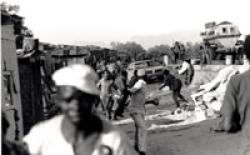
Published date
13 February 1990
Fifty people were killed over three days in battles between Inkatha Freedom Party (IFP) and United Democratic Front (UDF) supporters in Natal, South Africa, following the release of Mandela on 11 February 1990.
One of the reasons advanced for this violence is that pro-government forces as well as members of the South African security establishment wished to destabilise and totally disrupt the negotiations between the African National Congress (ANC) and other political formations and the Apartheid regime. A further reason was that the UDF was growing in popularity in Natal, which was traditionally considered an Inkatha stronghold. The release of Nelson Mandela on 11 of February 1990 intensified the violence.
It was also during this period that rumours of a Third Force emerged and much of the instability and political violence of this period was blamed on these elements. The transitional talks culminated in the first democratic election on 27 April 1994 eventually ushering in a democratic South Africa
References
Human Rights Watch, (1991), Human Rights Watch World Report 1990 - South Africa, from refworld, 1 January, [online], Available at www.refworld.org [Accessed: 10 February 2010]|Ellis .S, (1998), The Historical significance of South Africa's Third Force,Journal of Southern African Studies, Vol. 24, No. 2, (June 1998.,1998),pp. 261-299|Farred .G, (1992), Unity and Difference in Black South Africa, Social Text, No.31/32, Third World and Post Colonial Issues, pp.217-234|Szevtel.M,(1991), Manoeuvres of War in South Africa, Review of African Political Economy, The Struggle for Resources in Africa, No.51, (July.,1991),pp.63-76